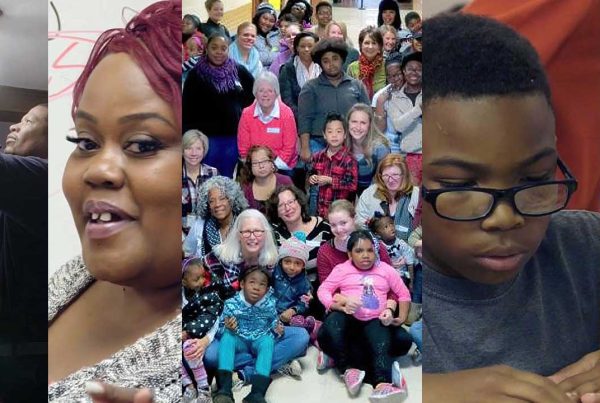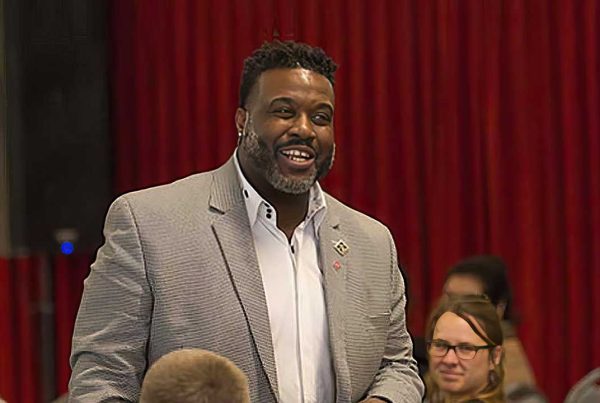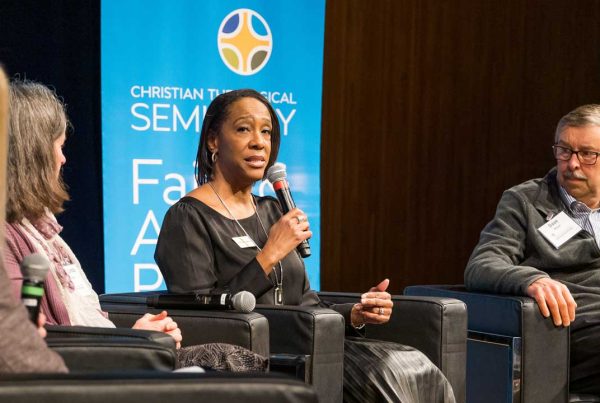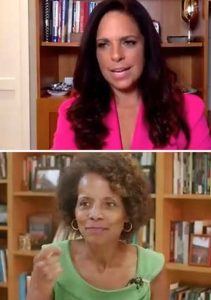 The way of love will show us the right thing to do every single time. It is moral and spiritual grounding and a place of rest amidst the chaos that is often part of life. It is how we stay decent in indecent times.
The way of love will show us the right thing to do every single time. It is moral and spiritual grounding and a place of rest amidst the chaos that is often part of life. It is how we stay decent in indecent times.
With those words, the Rev. Michael Curry, Presiding Bishop and Primate of The Episcopal Church, offers a path through this world struggling against racism, a pandemic, poverty and political polarization. It was a pathway CTS Dean of Faculty Dr. Leah Gunning Francis walked on Wednesday with award-winning journalist Soledad O’Brien. Talking as part of the Faith & Action Project’s 2020 online Fall Event, Francis and O’Brien delved into some of the societal flaws that have been exposed by our difficult times, and measures that must be taken to repair those flaws. Francis addressed some of those same issues in a follow-up conversation with Indianapolis Urban League President Tony Mason, Project Azul Executive Director Yecenia Tostado, and Patricia Payne, Director of the Racial Equity Office for IPS. We are grateful for the support of CICF to make this crucial and timely discussion possible. We are also grateful for you and the ways you might use your influence or role to change systems and bring about a better tomorrow. Together, we strive, as the Rev. Curry suggests, “to stay decent in indecent times,” knowing that, indeed, the way of love is the way we must go. Following are 10 things we learned from the Fall Event conversations.
Ten Lessons Learned
The following offers 10 highlights from the conversation that CTS Dean of Faculty Dr. Leah Gunning Francis had on Wednesday with award-winning journalist Soledad O’Brien, Indianapolis Urban League President Tony Mason, Project Azul Executive Director Yecenia Tostado and Patricia Payne, Director of the Racial Equity Office for IPS. The discussions were a part of the Faith & Action Project’s 2020 virtual Fall Event. You can see the entire conversation here.
- Wealth disparities are exacerbated by the pandemic. O’Brien put a clear lens on wealth gaps in the U.S. “We know that the net worth of white people on average is around $835,000, $126,000 for Black people and $166,000 for Latino households,” she said, adding that while about 15 percent of white people have a zero or negative net worth, that percentage shoots up to 40 percent for Black households. “So if you’re layering in the long tail of a pandemic on that,” O’Brien said, “you can see that the potential – it’s already disastrous – the potential to fall even further behind is very, very high.” Mason echoed these points by highlighting the “American Dream” index, which tracks the ability of different groups to achieve the earmarks of the “American Dream”. In a culture where white Americans have a 100 percent access to that status, Black Americans have 73.8 percent chance, and Hispanics have a 78 percent chance.
- The faces of poverty are hidden in plain sight. Having made a number of documentaries examining race and poverty, O’Brien said she believes that many Americans’ visions of poverty is not accurate. They think either of the classic hobo with a stick and a bag full of possessions, or of people living in squalor. But the reality is that poverty affects “regular” people and families. “They go to school with us, they work with us and they live near us and they are struggling, and possibly on the verge of falling down and falling under,” she said, adding that many people are just one emergency away from complete economic meltdown… and that emergency could be the pandemic.
- We’re all in this together, so we can’t wait until it affects us personally to care. While shooting a documentary about the pandemic in Seattle, O’Brien heard from homeless people who said with the arrival of the pandemic, people suddenly took an interest in them… for selfish reasons: “Nobody worried too much about whether there were bathrooms, if there were places where [homeless people] could wash their hands, should they move inside, where could they move, until suddenly they felt like, ‘Oh this might affect the greater community.’ And then, suddenly, they care.” O’Brien followed that up by using a sinking boat as a metaphor for how poverty affects a community: While one group of people might be affected before another if there is a hole in one end of a boat, eventually everyone will be affected.
- There is a difference between doing charity and doing justice. Sharing a story about a group of people handing out backpacks to kids, O’Brien noted that the group was quite pleased with its efforts, but showed no interest in understanding why the children needed the backpacks. Real justice work, she urged, must go beyond charitable acts to attack the reasons people are in poverty, shifting the conversation to one about access to opportunity and racial and economic equity. In that vein, Mason applauded the work of Eastern Star Church and its ROCK Initiative, which seeks not simply to serve people in its neighborhood but to transform the neighborhood. Payne added, “What we don’t need are more missionaries. We don’t need people who are coming to feel sorry for poor children. We need people who are in there willing to work and to lift up who our children are.”
- Our problems are systemic, and the solutions must be as well. Too often, we look at the problems in our society in silos, O’Brien noted. “I don’t believe that we’re in a time when we look at all of these issues as disparate: housing over here, food over here, education over here, healthcare over here, wages over here,” she said. “They’re really a holistic system.” And that system intertwines with another, Payne added: systemic racism, which, she said “shapes the outcomes of everything.” This system is built on a deficit model that views people – especially children – in poverty with the systemic oppression of low expectations. With these factors working in collusion, piecemeal solutions won’t be effective. “We need to approach it from all angles,” said Tostado, adding that we must be willing to examine our government, our nonprofits and their program approaches, the staffs of our organizations and more, to increase diversity and reshape our society into one with greater equity for all. O’Brien concluded that we face a moral dilemma that should compel us to attack, confront and change our systems.
- Our works must be supported by faith. Quoting the book of James — “Faith without works is dead” — O’Brien said justice work should be a natural outgrowth of faith. To illustrate the impact that faith-filled work can have, O’Brien highlighted St. Peter’s United Church of Christ in Louisville, where a once-dying, all-white church in a marginalized neighborhood blossomed when it hired a Black woman, Jamesetta Ferguson, as its pastor and embraced its community with service and programming. “She has turned the church into the center of the community,” O’Brien said. “It was considered radical in a way to open up the church to the community.”
- It shouldn’t be radical to want the basics for everyone. After Francis noted that, “We often hear the term radical attached to concepts like living wages and affordable access to comprehensive health care and every child going to a school that is well funded and resourced, and college students graduating without tens of thousands of dollars in debt,” O’Brien noted that these ideas that once seemed so radical likely will begin to seem less radical because more people are talking about them. “That undermines the framing of ‘radical,’ because [people might say,] ‘I don’t feel particularly radical, but I’d like my kid not to come out of college with $60,000 in debt.”
- Too many get “into the game” late. Wealth gaps and other deficits in the system mean people in certain groups effectively are behind before they even start, a situation that Payne described by using a game of Monopoly as a metaphor. “When you start behind, it’s hard to catch up,” she said. “If you start three to five hours behind everybody else, when you get into the game, everything is gone. All the hotels have been purchased. All the resources are gone. So when you land in jail, you kind of feel relief… I see that happening now in this society.”
- Conversation is important, but it must lead to action. All of the speakers, from O’Brien to the local leaders, applauded the increased level of conversation we’re seeing around matters of racial and social justice, but they all also said that talk is not enough. “I really want to empower everyone to get involved, dig into these conversations, be intentional about opportunities to learn, but be ready to move beyond the conversation and into action,” Tostado said. For the business community, she added, action should come in the form of intentional efforts to bring diversity to leadership roles, to build a diverse workforce and to have a diverse board.
- We all must be counted. This year, Americans have two opportunities to be counted, and we must seize both, the local panelists noted, if we are to show our strength and make our cries for justice heard. “I would say to everyone participating today, make sure you vote,” Mason said. “And make sure you complete the census.” Tostado urged the audience to also advocate for policies that would help people on the margins, and to use whatever power or influence they might have to change the systems that hold people in poverty.
Worth Reading
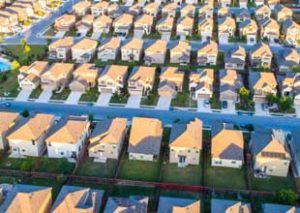 Safe and affordable housing has been highlighted often by Faith & Action Project grant recipients and guest speakers as a key tenet for a pathway out of poverty. After all, if a family lacks access to affordable housing, it usually also lacks access to a path toward stability. An alarming article recently released by New America’s Future of Property Rights Team shines a light on this reality. “Displaced in America” contains a county-level visual heat map of housing loss nationwide, a new National Housing Loss Index, and analyses of three communities facing different housing crises: Phoenix, Winston-Salem and Indianapolis.
Safe and affordable housing has been highlighted often by Faith & Action Project grant recipients and guest speakers as a key tenet for a pathway out of poverty. After all, if a family lacks access to affordable housing, it usually also lacks access to a path toward stability. An alarming article recently released by New America’s Future of Property Rights Team shines a light on this reality. “Displaced in America” contains a county-level visual heat map of housing loss nationwide, a new National Housing Loss Index, and analyses of three communities facing different housing crises: Phoenix, Winston-Salem and Indianapolis.
Mark your calendar
October 5, 2021: Faith & Action Fall Event with Bryan Stevenson, author of Just Mercy


